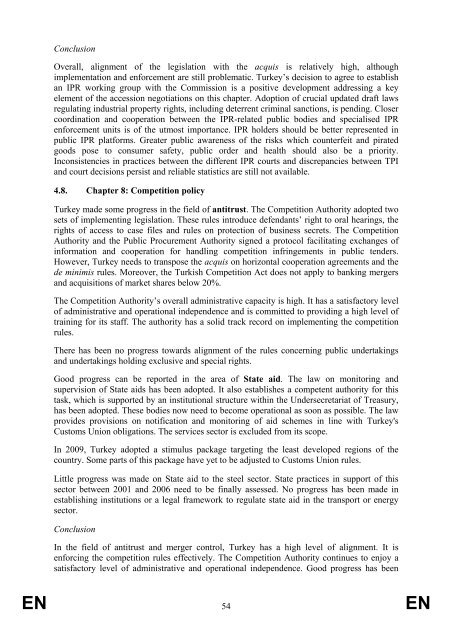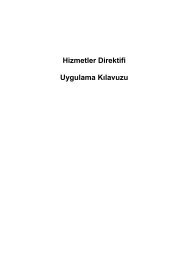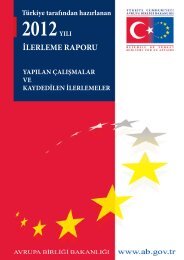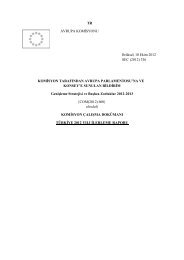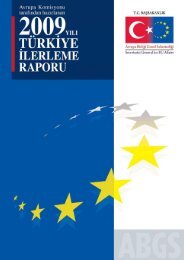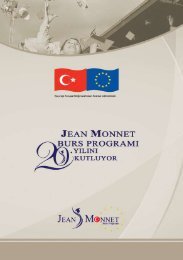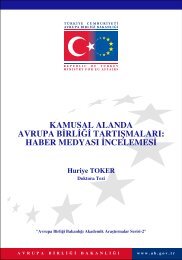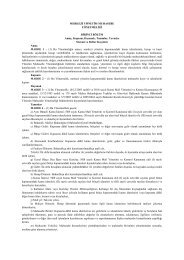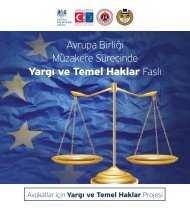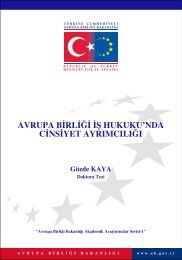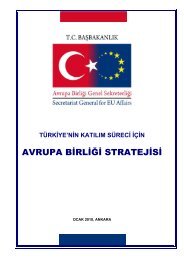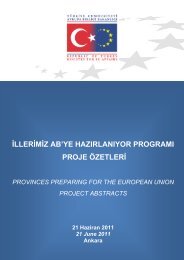2010 ilerleme raporu - Avrupa Birliği Bakanlığı
2010 ilerleme raporu - Avrupa Birliği Bakanlığı
2010 ilerleme raporu - Avrupa Birliği Bakanlığı
You also want an ePaper? Increase the reach of your titles
YUMPU automatically turns print PDFs into web optimized ePapers that Google loves.
ConclusionOverall, alignment of the legislation with the acquis is relatively high, althoughimplementation and enforcement are still problematic. Turkey’s decision to agree to establishan IPR working group with the Commission is a positive development addressing a keyelement of the accession negotiations on this chapter. Adoption of crucial updated draft lawsregulating industrial property rights, including deterrent criminal sanctions, is pending. Closercoordination and cooperation between the IPR-related public bodies and specialised IPRenforcement units is of the utmost importance. IPR holders should be better represented inpublic IPR platforms. Greater public awareness of the risks which counterfeit and piratedgoods pose to consumer safety, public order and health should also be a priority.Inconsistencies in practices between the different IPR courts and discrepancies between TPIand court decisions persist and reliable statistics are still not available.4.8. Chapter 8: Competition policyTurkey made some progress in the field of antitrust. The Competition Authority adopted twosets of implementing legislation. These rules introduce defendants’ right to oral hearings, therights of access to case files and rules on protection of business secrets. The CompetitionAuthority and the Public Procurement Authority signed a protocol facilitating exchanges ofinformation and cooperation for handling competition infringements in public tenders.However, Turkey needs to transpose the acquis on horizontal cooperation agreements and thede minimis rules. Moreover, the Turkish Competition Act does not apply to banking mergersand acquisitions of market shares below 20%.The Competition Authority’s overall administrative capacity is high. It has a satisfactory levelof administrative and operational independence and is committed to providing a high level oftraining for its staff. The authority has a solid track record on implementing the competitionrules.There has been no progress towards alignment of the rules concerning public undertakingsand undertakings holding exclusive and special rights.Good progress can be reported in the area of State aid. The law on monitoring andsupervision of State aids has been adopted. It also establishes a competent authority for thistask, which is supported by an institutional structure within the Undersecretariat of Treasury,has been adopted. These bodies now need to become operational as soon as possible. The lawprovides provisions on notification and monitoring of aid schemes in line with Turkey'sCustoms Union obligations. The services sector is excluded from its scope.In 2009, Turkey adopted a stimulus package targeting the least developed regions of thecountry. Some parts of this package have yet to be adjusted to Customs Union rules.Little progress was made on State aid to the steel sector. State practices in support of thissector between 2001 and 2006 need to be finally assessed. No progress has been made inestablishing institutions or a legal framework to regulate state aid in the transport or energysector.ConclusionIn the field of antitrust and merger control, Turkey has a high level of alignment. It isenforcing the competition rules effectively. The Competition Authority continues to enjoy asatisfactory level of administrative and operational independence. Good progress has beenEN 54 EN


